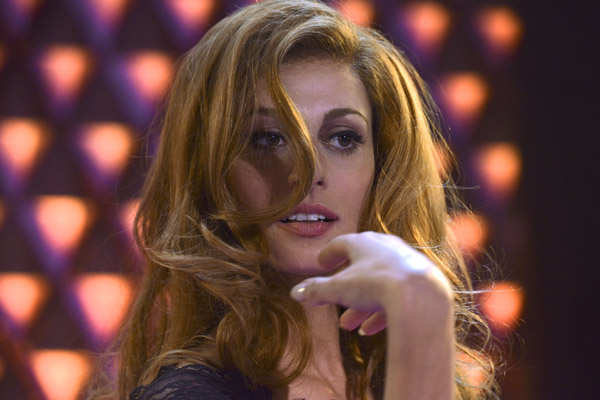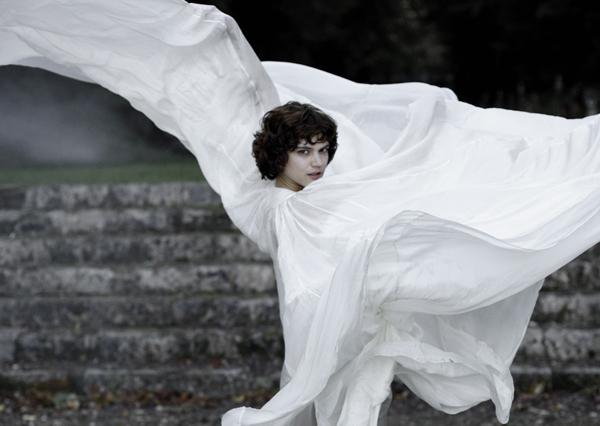Two restless, intractable talents dominate European biopics of female stars, little known to the American public. Director Lisa Azuelos zeroes in on Dalida, the Egypt-born Italian singing sensation who thrilled all of Europe in a career that spanned ballads, ye-ye, and disco before her suicide in 1987. First-time director Stéphanie di Giusto focuses on Loïie Fuller, an American who decamped from the United States to France, bent on making her name in the wildly creative but treacherous world of Belle Epoque avant-garde dance. Not without flaws, both films will hold appeal to divaphiles and lovers of high-end cinematography and period design.
Dalida
Though she had a career that spanned three decades and sold 170 million records, Dalida never really caught on in the States. So how can Americans get their heads around the Dalida phenomenon? Try comparing her persona to the soulful Barbra Streisand, the tragic Judy Garland, and even the earthy early Madonna. The movie rides heavily on the willowy, angular charisma of Italian actress Sveva Alviti, gamely playing a doomed star in thrall to her music but dragged down by the pop machine and a string of destructive men.
Dalida starts in Cairo, where cruel schoolmates and a family broken by World War II impact young Iolanda Gigliotti and set her on a heartbroken path. But singing brings out the girl’s beauty and spirit, and an escape to Paris kick-starts a career managed by a manipulative older first husband in cahoots with impresario Eddy Barclay (Vincent Perez). The sky’s the limit, and Iolanda, now Dalida, is on her way to the Olympia.
The movie crams a great deal of plot and people into its time frame, using montage to hustle viewers along the singer’s conquest of the charts (spinning records!) and attainment of international stardom (airplanes! champagne!). But stolen moments with lovers reveal intimacy and the longing for love in a fast, pitiless world. Not that those refuges endure. Dalida’s abandoned first husband kills himself. After blowing a cue at an important music festival, a brooding young protégé does the same. And finally a liaison with an ultrasuede-clad impostor posing as a nobleman (a convincingly sleazy Nicolas Devauchelle) ends in his suicide as well . No wonder the “Do not disturb” sign placed on a hotel door becomes a recurring motif.
Some of Dalida‘s scenes may veer close to camp for more demanding viewers, but the film soothes objections with yearning arrangements of classic pop songs on the soundtrack in Italian, Spanish, Arabic, and French—a playful duet with actor Alain Delon provides the cassis in the kir royale. Openly stagey shots balance darkness with glossy transparency, and meticulous period detail brings out the glamour of even questionable pop periods like the 1970s with a rigorous panache that most American movies just can’t match. If a life electric with tragedy, stardom, and legend thrills you, you may find Dalida rather magnifique.
The Dancer
A biopic on avant-garde dancer Loïie Fuller, The Dancer takes bewildering liberties with the details of its subject’s life. Fuller was born in the suburbs of Chicago to American parents, so why give her a French father shot dead in the American West—fully clothed in a bathtub outdoors? Only first-time director Stephanie di Giusto knows for sure. Anyway, the conceit leads to some great shots and lets us know right off the bat that we are dealing with a mercurial talent.
The real-life Fuller made a name for herself at the Folies-Bergère. Her dance routines featured wings of billowing fabric, dangerous chemicals, and elaborate electric lighting effects, and the movie is at its best showcasing Fuller’s high-wire ambitions in a smoky, high-contrast palette. Singer and actress Soko deploys intense concentration playing a driven, willful character who lives for her art. Gaspard Ulliel, so electric in Saint Laurent (2014), hovers as an effete aristocrat who may be more than just a patron to the pioneering American. Mélanie Laurent radiates stern, watchful gravitas as a helper in the wings. She’d be perfect playing Fuller’s rival, Isadora Duncan, actually and unfortunately played here by Lily-Rose Depp, tentatively speaking in wimpy contemporary American English as if she’s stumbled in from some other movie altogether. Hey, it’s who you know, right?
While Dalida has traces excessive plot, The Dancer allows itself too many longueurs and ambiguities to interrupt the action. However, arty setups and abrupt cuts knock the story in unpredictable directions. For those who can handle slightly batty risk-taking, The Dancer winks with the energy of one of its illuminated dance contraptions.








Leave A Comment